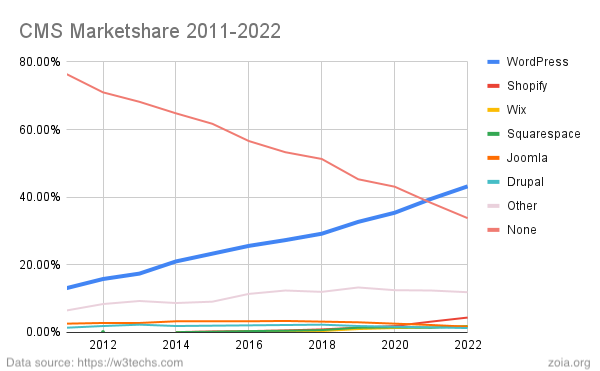Wordpress: What is it for?
Wordpress is…
Wordpress is steadily gaining marketshare. As of January 2021, 32% of all websites in the World use Wordpress, the runner-ups being Shopify with 4.3%, and Wix with 2.3%. being Joomla with 2.6%.
Wordpress is no longer just a fine Content Managing System (CMS). As Wordpress’ backend continues to consolidate and improve, it’s morphing into a full application framework. This means that Wordpress is not only going to further differentiate from its runner-up competitors, but also that it’s expanding into other market segments.

An application framework is a series of software components that help developers build applications by providing frequently used functionality. For example, most applications need to implement user authentication, database management, security, input sanitizing and processing, user-interface management, etc. Instead of starting from scratch or developing their own libraries, developers can focus on the unique aspects of their applications and use off-the-shelf functionality for the rest. Stable frameworks with large development communities have the advantage of stability and active support.
While Wordpress is commonly associated with building blogs and information-oriented webpages, it can potentially be used to develop a whole range of application types. An example of Wordpress as an application framework is WooCommerce, the popular extension that allows you to build a full-fledged e-Commerce site on top of Wordpress.
Another advantage of Wordpress is the whole
The no-code movement.
Also, thanks to Gutenberg, the block editor launched some years ago, the experience of creating sophisticated layouts in Wordpress without the need to write code is becoming better and better.
For this website, I value frictionless writing. I don’t need sophisticated layouts, because the layout has already been defined by the template, and I write articles.
It’s like… [using something full-fledged] when [something more simple is enough.]